书享界前言
耶鲁大学,是美国最古老的大学之一,处处散发着浓厚的人文历史气息,美国著名常青藤院校,其本科学院与哈佛大学、普林斯顿大学本科生院齐名,历年来共同角逐美国大学本科生院美国前三名的位置。
*本文首发耶鲁北京中心(YaleCenterBJ),书享界舒小米重新排版
耶鲁大学校长2018迎新演讲全文(中文)
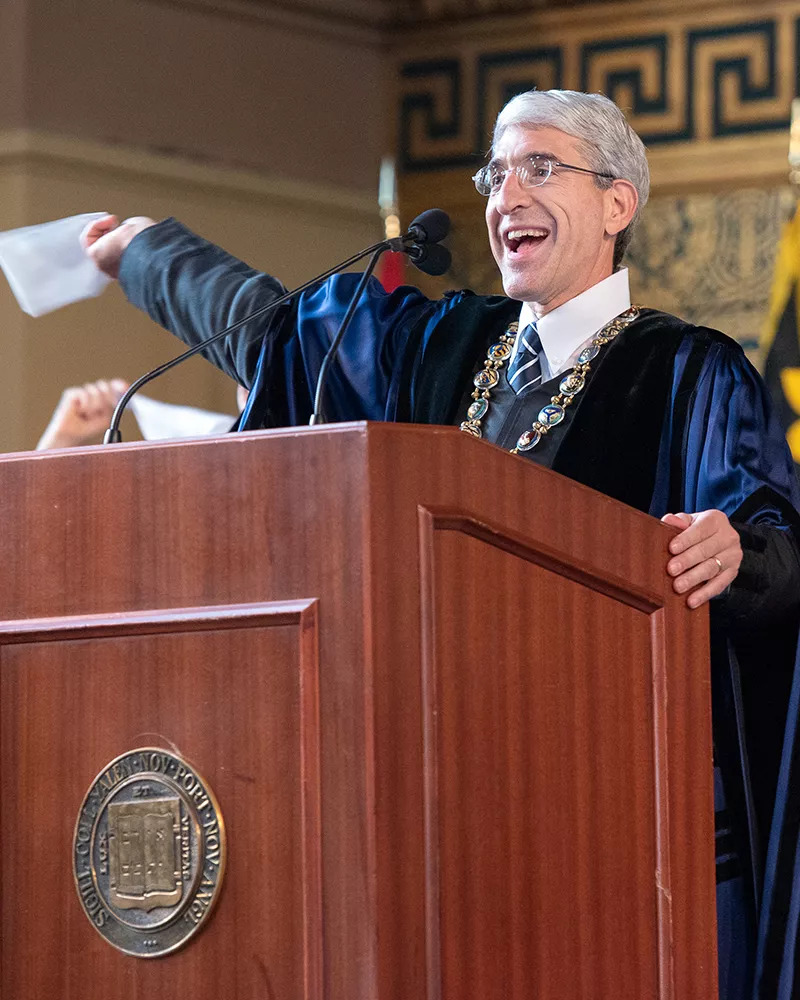
大家早上好,在此我谨代表各位同事向2022届的本科新生们、转校生们以及Eli Whitney项目的学生们表示最诚挚的欢迎。欢迎来到耶鲁!
今天是激动人心的一天,也是值得庆祝的一天。你们中的许多人今天和家人一起来到现场,带着自豪和一丝紧张,一起来庆祝人生中的这一重要里程碑。
今天也是耶鲁诸多传统中的一天。你们将看到很多精彩的仪式,有些是近几年才开始的,有些则相当古老。许多历史悠久的仪式,至今仍然相当流行,深受耶鲁人喜爱。当然,现在在座的你们也是耶鲁人!
耶鲁的传统之一是唱一首古老的歌曲,叫Bright College Years 《美好校园年华》。它诞生于19世纪晚期,虽然是非官方的歌曲,却受到广泛认可。你将在许多校园活动中听到这首歌,通常是由耶鲁合唱团或其他耶鲁团体演唱,或是在美式橄榄球比赛后由耶鲁大学仪仗队进行演奏。
当然,我不是个歌手。我其实是一名蓝草贝斯手。但现在,我希望你们能允许我给大家小唱一段:
春去秋来,花落花开
碧绿草地,转瞬皑皑
星斗虽移,世事或迁
耶鲁情谊,坚固永远
这是《美好校园年华》歌词中我最喜欢的一段,也是相当真切的一段。我相信有一天你们也会发现这段话的道理。但是我想用来开始今天演讲主题的,是这首歌的最后几行,也就是在校友聚会中深受欢迎且被多次传唱的一段:
努力奋发,一如从前
相与相勉,牢记箴言
鼓勇扬帆,沧海征途
为主为国,也为耶鲁
“为主为国,也为耶鲁。”这首歌是耶鲁大学1881届一位名叫Henry Durand的学生所作,最后这一段歌词是为了号召大家团结奋发。在当时,像Henry Durand一样,大多数的耶鲁学生都来自同一个国家,信奉同一宗教。甚至到本世纪上半叶,大多数耶鲁人都是白人、新教徒且来自美国本土。直到50年前,耶鲁学生甚至全部为男性。
当然,今天的耶鲁早已不再是当时Henry Durand所认识的那所大学。我们欢迎来自世界各地的学生,不论背景,不分阶层。
作为耶鲁大学的毕业生,我感到很自豪。1986年,我在耶鲁大学获得心理学博士学位。如果在一百年前,我很可能由于我的背景而无法被耶鲁大学录取。我是来自东欧的犹太人,我的妻子Marta也是一位耶鲁毕业生,她于1984年获得公共卫生硕士学位,而她的家族来自波多黎各。我们的故事无独有偶。过去几十年,耶鲁大学的校门为全球学生敞开,我们组成了一个更大、更包容的大家庭。
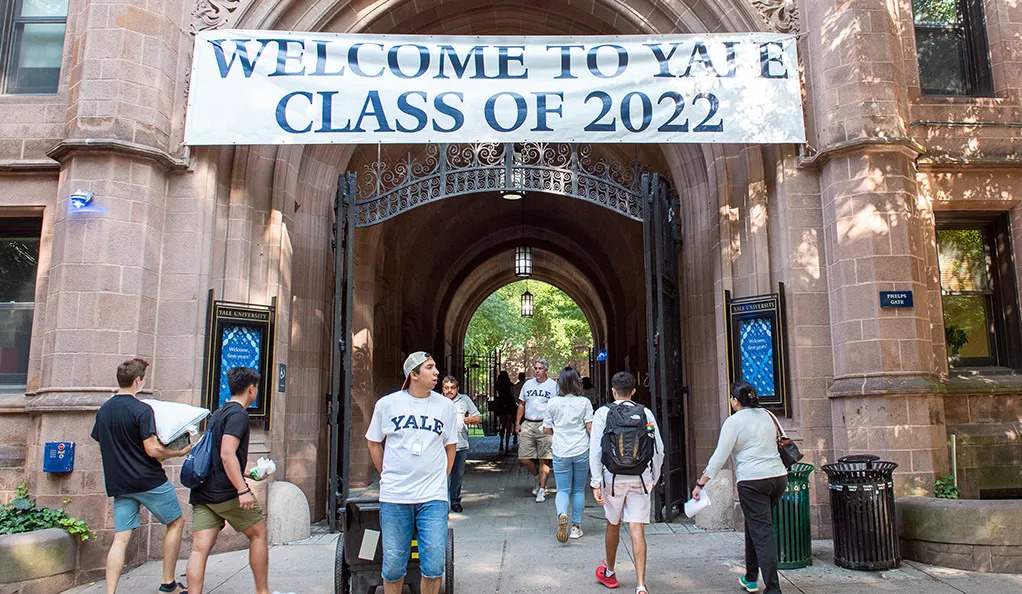
尽管我们之间存在着差异和多样性,但是我们有一个非常重要的共同点:我们都共享着耶鲁大学。无论你们来自哪里,无论你们是谁,也无论你们如何迈入耶鲁大门,现在,相较于其他身份,你们更是这个社区的成员。你们属于这里。你们,都是耶鲁公民。
在我们的国家,乃至当今世界,关于公民身份和移民问题的争论非常激烈。但在耶鲁,我们对移民和国际学生学者的重要性没有任何质疑。大学的教育和研究工作需要人类及其思想在国家之间自由流动。代表这所大学,我欢迎来自世界各地的学生和学者来到我们的校园。
耶鲁公民身份并非基于国家和地域。我们的学生来自全球121个国家;同时它也不是基于我们对某种信仰或教条的坚持,因为我们所有人为这个校园带来了极为广泛的观点和视角。相反,我们是耶鲁公民,是因为我们都渴望学习、理解并创造。我们都属于同一个学术团体,致力于追求Urim v’Thummim(起源于希伯来语,意为光明与真理),lux et veritas(拉丁语,意为光明与真理),光明与真理。
我们中有诗人、心理学家、历史学家、科学家、医生和院长,但我们都共有一个根本目标:扩大已知世界的视野,提出动摇知识基础的问题,并以新的答案重新建构。
我们的世界迫切需要新的想法和解决方案;我们需要了解人类所处的环境,认识我们的星球。
我们需要洞察基因组;我们需要在抗击疾病、减轻痛苦和伸张正义的能力上取得突破;我们需要对紧迫和长期存在的问题做出回应。
你们将在耶鲁应对这项重要的工作。在这里的经历将塑造你们的余生,因为你们将拥有大多数人梦寐以求的机会。
如果说耶鲁教育是一种你们得到的权利,那么随之而来就有相应的义务。今天我想谈谈耶鲁公民的一些最重要的义务。我要阐述其中四条:
始终保持好奇心的责任;
倾听他人,即使当他人的想法令你鄙视,也应与之自由交流思想的责任;
创造尊重的文化的义务;
以及利用你的天赋来服务他人与世界的义务。
第一个义务涉及到我们的学术工作。我们的校园必须是一个有助于深入学习的地方,以激励终生学习,促进性格发展。这将对于你成为未来领袖大有裨益。
耶鲁会对你们有诸多要求。有些时候,你会无法理解一项作业而陷入自我思想斗争;你也可能会在某次期中考试中表现不佳——至少我希望这些都能够在你们身上发生!那些失败和你的成功一样,意味着你在做正确的事。善待自己,并时刻记得你来到耶鲁是因为你还有需要探索的未知领域。
作为教师和导师,耶鲁的教职员工将和你们并肩前行。这是我在耶鲁大学任教的第三十三年,和学生一起工作是教授这个职业的一大乐趣。去了解你的教授,他们会帮助你加深和扩展你的专业知识。最重要的是,允许你的好奇心插上翅膀,带领你进入学习、实践和发现的全新领域。
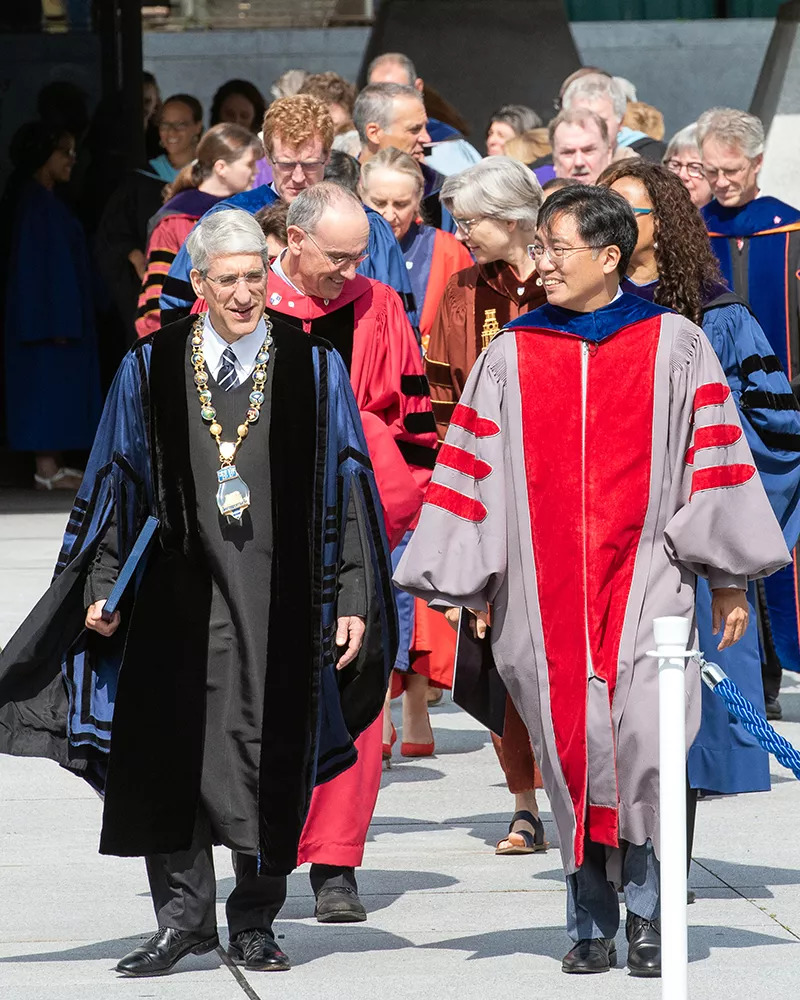
我在大学时参加了一些我并没有计划的课程,它们改变了在四十年后的我看世界的方式。当时我上了一门关于戏剧风格历史的课,一门诗歌创作的课,一门应用社会学课,还有一门涉及有趣的田野调查的地质学课。确保你在耶鲁能够探寻足够广泛和多样的学术经验。
第二,作为耶鲁的公民,我们有义务认真倾听他人的意见,虽然有时这意味着我们必须倾听那些反对我们的想法。你不需要同意每个人,但我们每个人都必须有机会表达自己的想法和观点。我们努力在校园中维护这一权利。我希望你们在耶鲁度过的这段时间里,有很多机会深入思考,并真诚且勇敢地谈论复杂的问题。
论述是学术事业的核心。所以,找时间与不同的人交谈,无论是在教室、餐厅还是在体育场上。
当然,要进行一场有意义的对话面临包括科技上的许多障碍。我不会试图说服你停止发短信或推特,但我会敦促你尽可能地放下手机,寻求面对面的交流。当我们面对面交流时,我们会更快乐,我们的关系也会更牢固。(任何一个听了Laurie Santos的课程《心理学和美好生活》的人都知道!)
在耶鲁,你会遇到拥有杰出天赋、前途和品格的人。在未来的日子里,我希望你结识不同领域的朋友,正如我对去年的毕业生所说的,画出一个更大的圈子,将样貌、谈吐、行动或思维与你不同的人囊括进去。去认识更多教职员工,去认识你在纽黑文市的邻居。你在谈话时也不要忘了倾听,超越那些你已经熟识的事物,将是衡量你的耶鲁时光的一大标准。
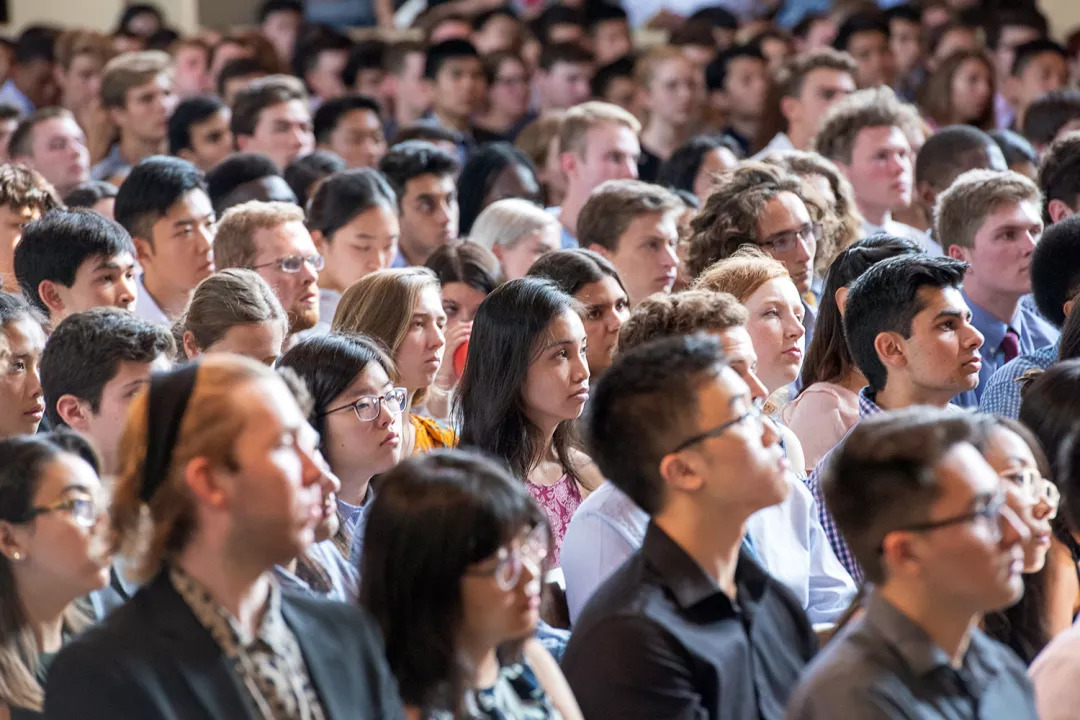
第三,作为耶鲁的公民,我们努力在我们的校园里建立一种相互尊重的文化。要做到这一点,我们必须让每个人都得到应有的尊严和认可。
Claudia Rankine是耶鲁大学的诗歌教授。在她的著作《公民:一首美国抒情诗》中,通过描述一些平凡的场景,她探讨了当代美国公民的身份和归属感。在此我想给你们读上一段:
在药店排队的时候,终于轮到你了,这时他却走到你前面,把他的东西放在柜台上。收银员说,先生,她是下一个。当他转向你的时候,确是一脸的惊讶。
“哦,天哪,我没看见你。”
“你一定很着急”,你主动解围。
“不,不,不,我真的没看见你。”
我们看得到谁,又看不到谁?放眼住宿学院和教室、餐馆,亦或是度假或工作期间,甚至是在我们的国家乃至我们的世界?我们看到的是谁,我们忽略的又是谁?
你们在耶鲁的生活将是忙碌而充实的。你们将在这里学习、工作、奉献或社交,我非常希望你们能有时间睡觉。但无论如何,你们要确保花时间去留意周围的人,试着通过他们的眼睛来想象这个世界,随时保持一颗同理心。我寄望于你们每个人,希望通过大家共同努力,确保耶鲁成为让每个人都感到有价值和受欢迎的社区。
最后,你们作为耶鲁公民的义务并不局限于这个校园。我们的校友可能是耶鲁服务传统最伟大的例证。在耶鲁大学毕业生中,曾有五人担任过美国总统,四人担任国务卿,十八人担任美国最高法院大法官,代表了不同政治派别的观点。
耶鲁校友中亦有几位在意大利、墨西哥、马拉维、韩国等国担任外国元首。此外,许多人作为教师、慈善家和导师改善了他(她)们的社区和城市;还有一些人缔造了商业帝国,创造了很多就业机会。
多年来,我们的学生和校友为公共利益做出了贡献。我真心希望你们也能够继承这一重要的耶鲁传统。
“为主为国,也为耶鲁”,这是《美好校园年华》的承诺。我和大家一样喜欢唱出这些歌词,即使我们信仰不同或没有任何信仰,即使我们是不同国家的公民或是没有国籍的人,我们都共享耶鲁。
作为这个社区的成员,我们为自己的“权利和责任”感到自豪。作为对享有耶鲁教育这份巨大权利的回报,我们把目光投向这个校园之外,追求更大的目标,“致力于改善当今世界,造福子孙后代”。这便是我们所共有的目标。
我坚信,耶鲁公民身份,同317年前这所大学成立时一样,在如今时代同样重要。世界一如既往需要光明与真理,它需要你们的领导和服务,需要你们带给它意义,同样需要你提出的问题。最重要的是,它需要你们无论成败,全力以赴。
作为拥有追求知识和理解这一共同目标的耶鲁公民,让我们从今天起开始我们的工作:提出新问题,仔细倾听,真诚发言,用新的眼光看问题,并为我们的社区和我们的世界做出贡献。
最重要的是,我希望今天你们能够在心中许下承诺:成为耶鲁的模范公民,建设我们所期的未来。
今天,当我环顾这个房间,看到在座的各位,我对耶鲁的未来和我们世界的未来充满信心。
2022届耶鲁公民们,祝你们好运!
耶鲁大学校长2018迎新演讲全文(英文)
Our Yale Citizenship
Speaker:
Peter Salovey, President of Yale University
Date:
Saturday, August 25, 2018
Event:
Yale College Opening Assembly Address, Class of 2022
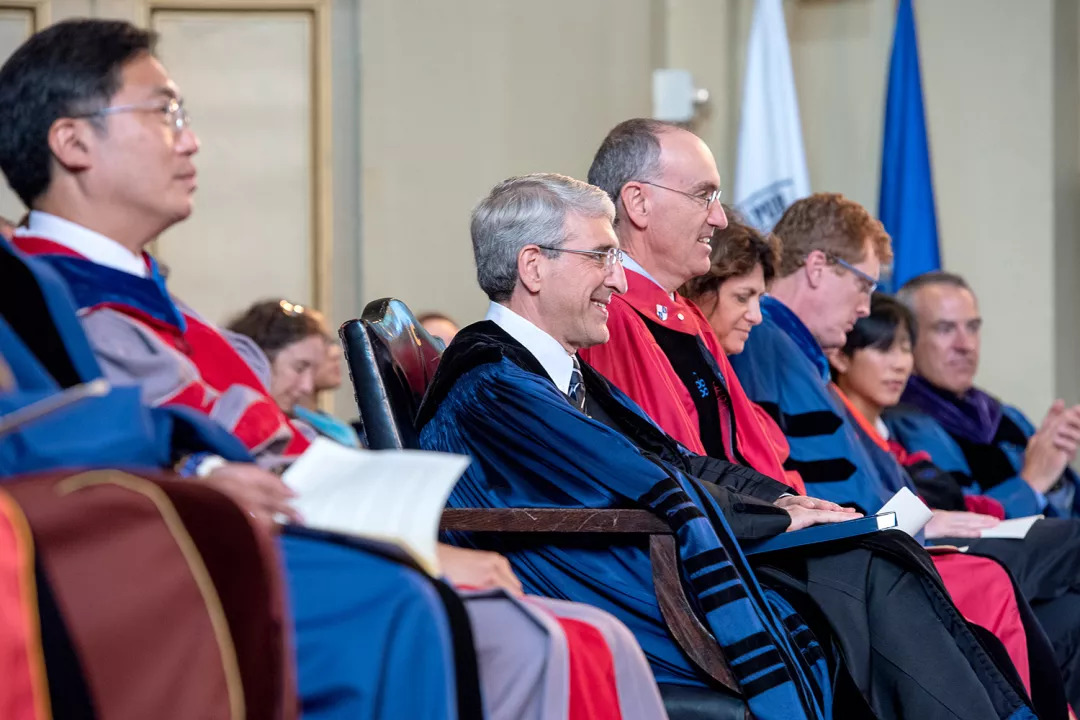
Good morning! On behalf of my colleagues here on stage, I extend a warm
welcome to all the family members with us today. And to the first-years,
transfer students, and Eli Whitney students: Welcome to Yale!
Today is a day of pageantry and excitement. Many of you bring
members of your extended families to cheer you on, celebrating this
milestone with justifiable pride and just a little anxiety.
Today is also a day of Yale traditions. You will encounter
countless wonderful rituals here, some recent and some quite old. Many
are steeped in history yet remain popular, even beloved, among Yalies.
(And remember, you are now a Yalie!)
One of our Yale traditions is singing an old song, “Bright College Years.” Written in the late 19th century, it is our unofficial, but widely acknowledged, alma mater. You
will hear it at many campus events, often sung by the Yale Glee Club
and other Yale groups, and played by the Yale Precision Marching Band
after football games.
Now, I am not a singer. I am a bluegrass bass player. But I hope you will indulge me for a moment:
The seasons come, the seasons go,
The earth is green or white with snow,
But time and change shall naught avail
To break the friendships formed at Yale.
These couplets are some of my favorites from “Bright College Years,”
and, in my experience, they are truthful. I suspect they will prove
accurate for you as well. But it is the song’s final lines, popular at
alumni gatherings and always sung with gusto, complete with the waving
of handkerchiefs, that I want to use to launch my topic for today:
Oh, let us strive that ever we
May let these words our watch cry be,
Where’er upon life’s sea we sail:
“For God, for Country and for Yale!”
“For God, for Country, and for Yale:” A member of the Yale College
Class of 1881 named Henry Durand wrote this ballad, and the final lines
were meant to be a rallying cry. It made sense in those days to presume,
as Durand did, that most Yale students shared, or at least professed to
share, the same god and the same country. Most Yalies, until recent
decades, were white, Protestant, and American. And of course, until
fifty years ago in Yale College, they were all men.
Today, Yale is a different place from the college Durand knew.
We welcome people from around the world, from every background and from
every walk of life.
I am proud to be a Yale graduate. I received my Ph.D. in
psychology from Yale in 1986. A hundred years earlier, I may have been
less likely to have been admitted to Yale on account of my background; I
am Jewish, with roots in Eastern Europe. My wife Marta, another proud
Yale graduate, received her master’s degree in public health in 1984;
her family is from Puerto Rico. Our stories are not unique. Over the
past decades, Yale has opened its doors wider and wider. We have
expanded the circle of belonging.
Yet despite our differences and diversity, we have at least one very important thing in common: we all share Yale.
No matter where you are from, or who you are, or your path to arriving
here, now you are—among other things—a member of this community. You
belong here. You are citizens of Yale.
In our country and our world today, questions about citizenship
and immigration are hotly contested. But at Yale, we share none of this
uncertainty about the critical importance of immigrant and
international students and scholars. The work of the
university—education and research—requires the free movement of people
and ideas across national borders. On behalf of this university, I
advocate for policies that will allow us to welcome students and
scholars from around the world to our campus.
Our Yale citizenship, however, is not based on national origin.
Our students hail from 121 countries. Nor is it based on our adherence
to a certain set of beliefs or dogma, as we bring an enormous range of
viewpoints and perspectives to this campus. Instead, we are citizens of
Yale because we share a desire to know, understand, and create. We are
members of an academic community dedicated to Urim v’Thummim, lux et veritas, light and truth.
We are poets and psychologists, historians and scientists,
physicians and deans, and yet we all share the same fundamental goal: to
expand the horizons of the known world. To ask questions that shake the
foundations of knowledge and to rebuild them again with new answers.
Our world is desperate for new ideas and solutions. We need to
understand the human condition and our planet. We need insights into the
genome. We need breakthroughs in our ability to fight disease,
alleviate suffering, and find justice. We need answers to urgent and
long-standing questions.
You will tackle this important work at Yale. The experiences
you have here will shape the rest of your lives, and you will have
opportunities that most people only dream of.
And because a Yale education is a great privilege, it comes
with certain obligations. I want to speak today about some of the most
important obligations of Yale citizenship. I will delineate four of
them:
- The responsibility to be curious, constantly;
- The duty to listen to others, even those whose thoughts you despise, and to exchange ideas freely;
- The obligation to create a culture of respect here;
- And the requirement to use the gifts you have been provided to serve others and the world.
So, the first obligation concerns our intellectual and scholarly
work. Our campus must be a place conducive to deep study that will
motivate both a lifetime of learning and the development of character
that will serve you well as future leaders.
Yale will demand much of you. There will be times when you
don’t understand an assignment or struggle with a problem set. You may
do poorly on a midterm. At least I hope so! Those failures—as much as
your successes—mean you are doing something right. Be kind to yourself,
and remember that you have come to Yale because you don’t know
everything—not yet.
The faculty will be alongside you, as teachers and mentors.
This is my thirty-third year on Yale’s faculty, and I know that working
with students is one of the great joys of this profession. Go to office
hours. Get to know your professors, and they will help you deepen and
expand your expertise. Most of all, allow your curiosity to take wing—to
take you in unexpected directions and lead you to new areas of study,
practice, and discovery.
I enrolled in courses in college that I hadn’t planned to take,
and they changed the way I see the world now, forty years later: a
course in the history of theater styles, a course in writing poetry, a
course in real-world (applied) sociology, a course in geology that
involved fascinating fieldwork. Make sure you explore the great range
and diversity of academic experiences available to you here.
Second, as citizens of Yale, we are obligated to listen
carefully to others. Sometimes this means we must listen to ideas we
find objectionable. You don’t have to agree, but each of us must enjoy
the opportunity to express thoughts and opinions. We work hard to
safeguard this right on our campus. I hope you will have many
opportunities to think deeply and speak honestly and courageously about
difficult issues during your time here.
Discourse is the heart of the academic enterprise. So, find
times and places for conversation, whether in a classroom, dining hall,
or on the athletic field.
There are many impediments to meaningful conversation,
including technology. I am not going to try to persuade you to stop
texting or tweeting altogether. But I would urge you to put down your
phones whenever possible, and seek out face-to-face interactions. We are
happier and our relationships are stronger when we do. (Just ask anyone
who took “Psychology and the Good Life” with Professor Laurie Santos
last year!)
You will meet people of remarkable talent, promise, and
integrity here at Yale. In the days and weeks ahead, I would urge you to
seek out a wide variety of friends and associates. As I said to last
year’s graduating class,draw a larger circle to include people who might look, talk, act, or
think differently from you. Introduce yourself to staff members; get to
know your neighbors in the city of New Haven. Your ability to speak but
also listen, to reach beyond what is familiar and easy, will be one of
the great measures of your time here at Yale.
Third, as citizens of Yale we strive to support a culture of
mutual respect on our campus. To do this we must accord each person the
dignity and recognition they deserve.
Claudia Rankine is the Frederick Iseman Professor of Poetry at Yale. In her powerful work, Citizen: An American Lyric,
she explores what citizenship and belonging mean in contemporary
America, often by describing mundane situations. I would like to read
you a passage:
“In line at the drugstore it’s finally your turn, and then it’s
not as he walks in front of you and puts his things on the
counter. The cashier says, Sir, she was next. When he
turns to you he is truly surprised.
Oh my God, I didn’t see you.
You must be in a hurry, you offer.
No, no, no, I really didn’t see you.”
Who do we see—or not see? In our residential colleges and classrooms,
in restaurants, on vacation and at work, in our country and in our
world? Who do we see, and who do we look past?
Your lives at Yale will be busy and full. You will study, work,
volunteer, socialize, and—I dearly hope—sometimes sleep. But make sure
you take time to see the people around you. Try to imagine the world
through their eyes; bring empathy and imagination to all that you do. I
am counting on each of you. Together we can ensure that Yale is a
community where each person feels valued and welcomed.
Finally, your obligations as citizens of Yale extend beyond
this campus. Our alumni are perhaps the greatest illustration of Yale’s
tradition of service. Five Yale graduates have served as U.S.
presidents, four as secretaries of state, and eighteen as justices on
the U.S. Supreme Court, representing viewpoints across the political
spectrum. Yale alumni have served as heads of state of several foreign
countries, including Italy, Mexico, Malawi, and South Korea. Many others
have improved their neighborhoods and cities as teachers,
philanthropists, and mentors. Still others have built businesses that
created jobs. For generations, our students and alumni have contributed
to the common good. I urge you to carry on this vital Yale tradition.
“For God, for Country, and for Yale:” This is still the promise
of “Bright College Years”—and I enjoy singing those words as much as
anyone—that even if we worship differently or not at all, even if we are
citizens of different nations or people without a country, we all share
Yale. We take pride in our “rights and responsibilities” as members of
this community. In return for the great privilege of a Yale education,
we look beyond this campus to pursue a larger purpose, to “improv[e] the
world today and for future generations.”This is what we share in common.
I am convinced that our Yale citizenship is just as vital today
as it was 317 years ago when this college was founded. The world needs
light and truth as much as ever. It needs your leadership and your
service. It needs the meaning you bring to the world and the questions
you ask. Most of all, it needs your best efforts—your successes and your failures.
As citizens of Yale sharing a common purpose—the pursuit of
knowledge and understanding—let us start today to begin the work we have
come here to do: to ask new questions, to listen carefully and speak
honestly, to see with new eyes, and to contribute to our communities and
our world. Most of all, leave this hall today with a commitment in your
hearts to be exemplary citizens of Yale, building the future we hope to
see.
Today, as I look out onto this room, I am optimistic about the future of Yale and the future of our world.
Good luck, Class of 2022!
书享界保留所有权 |书享界 » 书享界 | 耶鲁大学校长2018迎新演讲全文
 书享界
书享界


